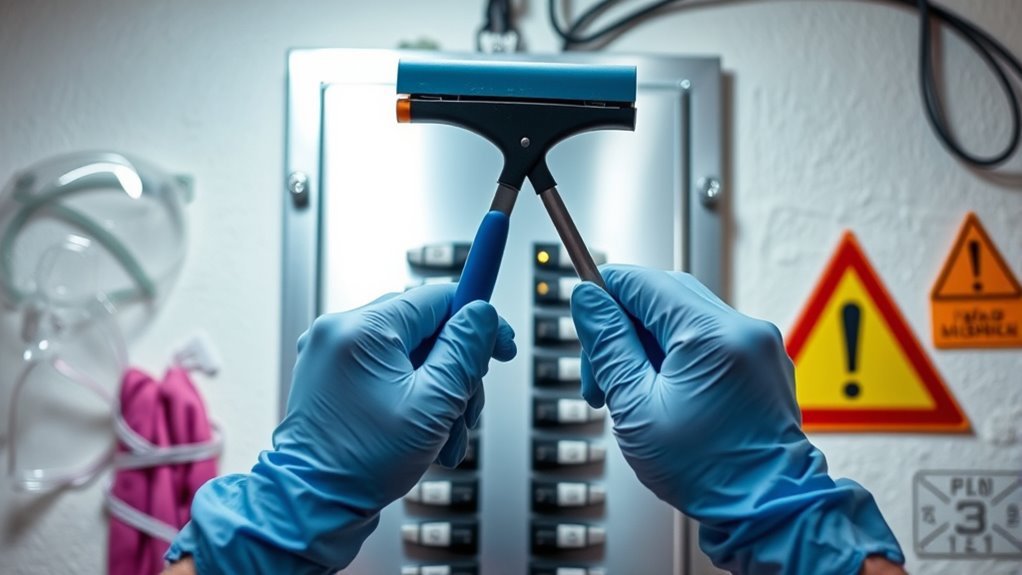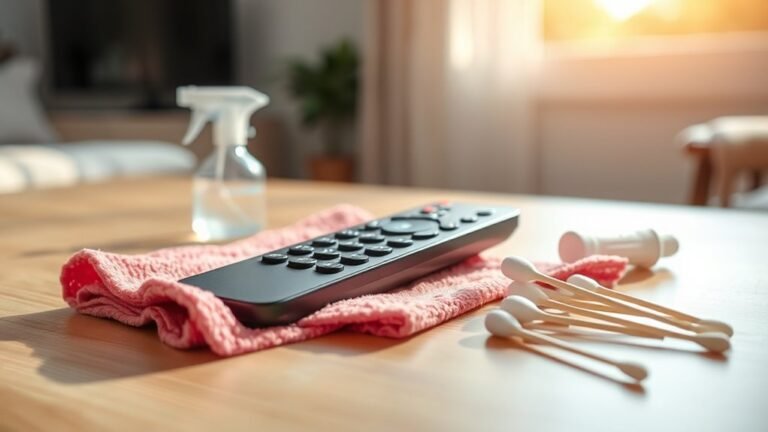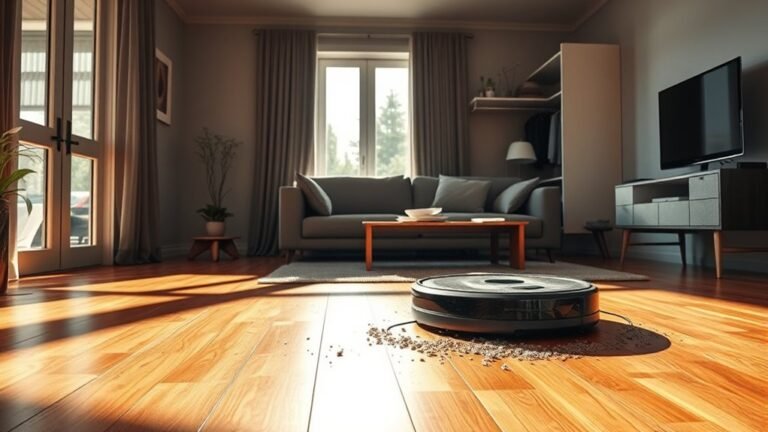Cleaning Tips for Home Electrical Panels
You should clean your home electrical panel at least once a year to prevent dust buildup and electrical hazards. Always turn off the main breaker and wear insulated gloves before cleaning. Use a soft brush or vacuum with a nozzle to remove dust—never use water or harsh chemicals. Regular checks for damage like loose wires or corrosion help catch problems early. Want to know the best tools, safety tips, and how to avoid common mistakes?
Understanding the Importance of Electrical Panel Maintenance

Although you might not think about it often, maintaining your electrical panel is essential for both safety and efficiency. When you prioritize the importance of maintenance, you’re not just protecting your home from potential electrical hazards—you’re also extending the electrical panel lifespan. Neglect can lead to corrosion, dust buildup, and loose connections, which might cause power interruptions or even dangerous fires. By staying on top of maintenance, you guarantee your system runs smoothly and reliably, giving you the freedom to enjoy your space without worry. Taking care of your electrical panel means fewer costly repairs down the line and a safer environment for you and your loved ones. It’s a small effort that pays off in independence and peace of mind.
Tools Needed for Cleaning Your Electrical Panel
To safely clean your electrical panel, you’ll need a few essential tools that make the job easier and more effective. Start with basic cleaning supplies like a soft brush or microfiber cloth to gently remove dust and debris without causing damage. A vacuum with a nozzle attachment helps suck up loose particles inside the panel. For maintenance tools, insulated screwdrivers and pliers are key—they let you handle components securely if adjustments are needed. Avoid using anything abrasive or liquid cleaners that could harm the panel’s sensitive parts. Having these cleaning supplies and maintenance tools on hand lets you keep your electrical panel in top shape, giving you the freedom to maintain your home’s system confidently and efficiently.
Safety Precautions Before Starting the Cleaning Process

Before you start cleaning, make certain to shut off the power to avoid any electrical hazards. Don’t forget to wear protective gear like insulated gloves and safety glasses to keep yourself safe. Also, guarantee the area is well-ventilated to prevent any buildup of dust or fumes while you work.
Power Shutdown Necessity
One essential step you can’t skip when cleaning your home electrical panel is shutting off the power. This power interruption is vital to keep you safe from electrical shocks and prevent damage to your panel. Before you start, make certain you know exactly how to cut the power at the main breaker or fuse box. It’s a small inconvenience that grants you the freedom to clean confidently. Remember, regular maintenance intervals are key to avoiding major issues, so plan your cleaning sessions accordingly. By shutting down power during these intervals, you protect both yourself and your electrical system. This simple step guarantees your cleaning process is safe, smooth, and effective—letting you maintain control over your home’s electrical health without risking harm.
Protective Gear Importance
After shutting off the power, you’ll want to gear up properly to stay safe during the cleaning process. Wearing protective gloves shields your hands from sharp edges and potential electrical residue, while safety goggles guard your eyes against dust and debris. These simple precautions give you the freedom to work confidently without unnecessary risks.
Here’s a quick look at essential protective gear:
| Gear | Purpose |
|---|---|
| Protective Gloves | Prevent cuts and electrical exposure |
| Safety Goggles | Protect eyes from dust and particles |
| Long-sleeve Shirt | Reduce skin exposure |
Area Ventilation Tips
Although you’ve already taken steps to guarantee your safety, it’s important to keep the area well-ventilated while cleaning your electrical panel. Proper air circulation helps prevent the buildup of dust and fumes that could pose health risks or even fire hazards. You can achieve this by opening windows and doors or using portable fans to promote fresh air flow. Consider simple ventilation solutions like positioning a fan to direct stale air outside, ensuring contaminants don’t linger around your workspace. Maintaining good ventilation not only protects your lungs but also creates a more comfortable environment, letting you work freely and confidently. Remember, fresh air circulation is a vital safety step before starting any cleaning process on electrical panels. Don’t overlook it—your freedom to work safely depends on it.
How to Turn Off Power Safely Before Cleaning

Before you start cleaning your electrical panel, make sure you turn off the main power supply to avoid any risk of electric shock. First, identify your home’s main breaker, usually located near the panel or your electrical meter. Using proper power disconnection methods, flip the main breaker switch to the “off” position to cut power safely. Before doing so, consider panel access considerations—ensure the area is clear, well-lit, and dry, so you can reach the panel effortlessly without hazards. If you’re unsure about which switch controls the main power, consult your panel’s labeling or a professional. Taking these steps gives you the freedom to clean confidently and safely, protecting yourself and your home from electrical accidents.
Step-by-Step Guide to Cleaning Dust and Debris
Now that the power is off, you’ll want to follow key safety precautions before starting to clean. Using the right tools and techniques guarantees you remove dust and debris without causing damage. Let’s walk through the steps to clean your electrical panel effectively and safely.
Safety Precautions First
Since electrical panels handle your home’s power, you’ll want to take safety seriously before cleaning any dust or debris. Start by turning off the main breaker to cut power completely—this is essential for electrical safety. Make sure you’re wearing insulated gloves and rubber-soled shoes to reduce shock risk. Avoid touching any wires or components inside the panel with bare hands or metal tools. Keep your workspace dry, and never clean the panel if there’s moisture present. Before you begin, inform everyone in your home that you’re working on the panel to prevent accidental power activation. These precautions protect you and extend the life of your panel. Remember, regular panel maintenance done safely keeps your home’s electrical system running freely without interruptions.
Proper Cleaning Techniques
A careful approach is key when cleaning dust and debris from your electrical panel. First, verify the main power is off to avoid any risk. Use a soft, dry brush or a microfiber cloth to gently wipe away loose dust—never use water or liquid cleaners. For stubborn debris, a vacuum with a brush attachment can help without disturbing components. Avoid compressed air, as it might push dust further inside. Focus on maintaining electrical panel hygiene by regularly inspecting and cleaning to prevent buildup that can cause overheating or faults. These panel cleaning techniques are simple but essential for keeping your system safe and reliable, giving you the freedom to manage your home’s power confidently and efficiently.
Checking for Signs of Wear and Damage
Before you start cleaning your electrical panel, you should carefully inspect it for any signs of wear and damage. Look closely at wear indicators like frayed wires, discoloration, or corrosion on breaker terminals. These signs can signal potential problems that might affect your panel’s safety and performance. Conduct a thorough damage assessment by checking for cracks, loose components, or burnt smells, which could point to overheating or electrical faults. Pay attention to any unusual noises or flickering lights connected to the panel, as these can also hint at underlying issues. Spotting wear and damage early lets you take control and maintain your electrical system’s freedom from unexpected failures. This step guarantees your cleaning efforts don’t overlook critical safety concerns.
When to Call a Professional Electrician
If you notice any burning smells, sparks, or frequent breaker trips, it’s time to call a professional electrician. Handling repairs yourself can be dangerous without the right knowledge and tools. Staying safe means knowing when to step back and let an expert take over.
Signs of Electrical Issues
How do you know when your home’s electrical panel needs professional attention? If you notice flickering lights or frequent tripped breakers, it’s a clear signal that something’s off. Ignoring these signs can limit your freedom, risking safety and convenience. Here’s a quick guide to recognize when it’s time to call a pro:
| Sign | What It Means |
|---|---|
| Flickering lights | Possible wiring issues |
| Tripped breakers | Overloaded circuits |
| Burning smell | Overheating or faulty wiring |
| Warm panel surface | Excessive heat buildup |
| Buzzing noises | Electrical faults or loose parts |
Stay alert to these signs. When you see them, don’t hesitate—contact a professional electrician to keep your home safe and your life hassle-free.
Safety Precautions for Repairs
Although it might be tempting to fix electrical panel issues yourself, you should always prioritize safety and know when to call a professional electrician. Electrical hazards are no joke—they can cause serious injury or damage if mishandled. If you’re unsure about any step or notice signs like burning smells, sparks, or frequent breaker trips, don’t risk it. Following proper repair guidelines is essential, but some tasks require expert knowledge and tools. Calling a licensed electrician not only protects you but also guarantees the job meets safety standards, giving you peace of mind. Remember, maintaining your freedom means knowing when to step back and let the pros handle complex electrical repairs safely. Your safety always comes first.
Preventative Measures to Keep Your Panel Clean Longer
Because your electrical panel is essential for your home’s safety and functionality, taking simple preventative steps can save you from frequent cleaning and potential hazards. Developing consistent panel maintenance habits, like regularly inspecting for dust buildup and moisture, keeps your system running smoothly. Dust prevention strategies such as sealing gaps around the panel and using covers can minimize debris entry. You might also want to control the environment by reducing nearby clutter and ensuring good ventilation to prevent dust accumulation. By adopting these habits, you’ll maintain a cleaner panel longer, giving you the freedom to focus on what matters most without worrying about electrical issues caused by dirt or neglect. Staying proactive with your panel’s care is the key to hassle-free, safe home living.
How Often Should You Clean Your Electrical Panel?
Since your electrical panel plays an essential role in your home’s safety, you shouldn’t wait until it looks dirty to clean it. Establishing a regular cleaning schedule helps prevent dust buildup and potential hazards. Frequency guidelines suggest inspecting and lightly cleaning your panel at least once a year. However, if your home is in a dusty environment or you have pets, you might want to check it more often—every six months, for example. Sticking to a consistent cleaning schedule not only keeps your panel functioning well but also gives you peace of mind. Remember, staying proactive with maintenance means you’re in control of your home’s safety and freedom from unexpected electrical issues.
Common Mistakes to Avoid During Cleaning
When cleaning your electrical panel, it’s easy to make mistakes that could lead to damage or safety risks. One common error is neglecting the recommended cleaning frequency; cleaning too often can disturb components, while waiting too long allows dust buildup that hampers performance. Another mistake is ignoring panel organization—failing to label breakers or maintain order can cause confusion and unsafe adjustments later. You should also avoid using water or harsh chemicals, which can corrode parts or create shorts. Finally, don’t attempt cleaning without cutting power first; this is essential for your safety. By sticking to an appropriate cleaning frequency, maintaining good panel organization, and following safety protocols, you’ll keep your electrical panel running smoothly and protect your freedom from unexpected outages.
Frequently Asked Questions
Can Cleaning an Electrical Panel Improve Energy Efficiency?
They say, “A stitch in time saves nine,” and that holds for your electrical panel too. While cleaning alone won’t drastically cut energy consumption, good panel maintenance can prevent issues that cause energy waste. By keeping your panel dust-free and in top shape, you help guarantee it runs smoothly and safely. This way, you maintain your home’s energy freedom without unexpected hiccups or inefficiencies.
Are There Specific Cleaning Products Safe for Electrical Panels?
When it comes to safe cleaners, you’ll want to avoid anything abrasive or liquid-based that could cause damage or shorts. A dry microfiber cloth or an anti-static brush works best for panel maintenance, letting you keep things clean without risking harm. You don’t need harsh chemicals—sometimes, less is more, giving you the freedom to maintain your electrical panel safely and confidently. Always make sure the power’s off before you start!
How Do Weather Conditions Affect Electrical Panel Cleanliness?
You’ll find that weather conditions heavily influence your electrical panel’s cleanliness. High humidity effects can cause moisture buildup, leading to corrosion or rust inside the panel. If your panel faces rain exposure, dirt and water can seep in, increasing the risk of electrical issues. To keep things running smoothly and maintain your freedom from frequent repairs, it’s smart to guarantee your panel is well-sealed and protected from harsh weather.
Can Pests Damage Electrical Panels and How to Prevent It?
You’d think pests could throw a party inside your electrical panel, but they can seriously damage wires and components. To keep your freedom intact, regular panel inspection is key—don’t let uninvited critters crash your setup. Pest prevention involves sealing entry points and keeping the area clean. By staying vigilant, you avoid costly repairs and maintain your home’s electrical independence without worrying about unwanted guests short-circuiting your life.
Is It Necessary to Label Wires During Panel Cleaning?
Yes, you should definitely label wires during panel cleaning. Wire identification is essential for keeping things organized and avoiding confusion later on. It’s a smart safety precaution that helps you or anyone else working on the panel understand what each wire does, reducing the risk of mistakes. Taking the time to label wires gives you the freedom to maintain and troubleshoot your electrical system confidently and safely.






